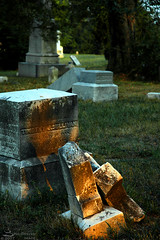Dismal
Sometimes I need a kick in the head ... or at least in the pants. With middle age comes a more present awareness of our mortality.
Washington Irving was 36 years old when he published "The Sketch-Book", including tales of old age (Rip Van Winkle) and death (The Legend of Sleepy Hollow). Although these were satire in nature, they were clearly aimed at the darker forces that envelop men even today. In these two stories he addresses pride and antisemitism under the guise of patriotism and covetous greed that's fed under an heir of intellect and stature.
The first is an obvious snobbery that taunts and threatens every outcast to the point that outcasts wouldn't exist without it. The second is more subtle and makes for a great study on literature. Even the smartest and most learned individual can fall into ignorance by the simplest and stupidest lack of moral character.
When these works were published they were touted by England as the first true sense of unique American literature in history. This is 30 years after the United States Constitution had been fully ratified and the government operations described therein realized. Our nation was still in its infancy.
Other works of literature that emphasized the dismal state of our mortality both physically and spiritually seem to have been developed at or past mid-life. Edgar Allen Poe wrote the Raven when he was 36, just four short years before his untimely demise. Dracula was written when Bram Stoker was 50. At 34 and 36, respectively, Stevenson wrote the Body-Snatcher and the Strange Case of Dr. Jekyll and Mr. Hyde.
The only strong literary works that I could find of similar gruesome content written by authors at younger ages involved the Year without a Summer. On July 1816, the inception of Frankenstein and The Vampyre occurred on a creative dare instigated by Lord Byron after reading Phantasmagoria. Mary Shelley was 19 and John Polidori was 21.
No man can know when his time is up. Luke 12:20 paints a dim picture of a rich man who swells with pride at his accomplishments, destined to die that night.
So in our mortal state, what do we do? Gravestones rot and break away. People are only remembered two or three generations at best, then forgotten. Each marker tells a story, but each story - like the fires that smoldered the great Alexandrian Library - are lost and unrecognizable.
My dad considered the brevity of life and suggested that our brief time on Earth is meaningless without good relationships. It won't be an intelligent and powerful person who finds worth in your ability who will hire you when you lose a job, it will be the friend who see a friend in need. Getting along well with others is essential to life, and living life in isolation brings a cold demise ... there will be enough isolation as we're buried alone.
Washington Irving was 36 years old when he published "The Sketch-Book", including tales of old age (Rip Van Winkle) and death (The Legend of Sleepy Hollow). Although these were satire in nature, they were clearly aimed at the darker forces that envelop men even today. In these two stories he addresses pride and antisemitism under the guise of patriotism and covetous greed that's fed under an heir of intellect and stature.
The first is an obvious snobbery that taunts and threatens every outcast to the point that outcasts wouldn't exist without it. The second is more subtle and makes for a great study on literature. Even the smartest and most learned individual can fall into ignorance by the simplest and stupidest lack of moral character.
When these works were published they were touted by England as the first true sense of unique American literature in history. This is 30 years after the United States Constitution had been fully ratified and the government operations described therein realized. Our nation was still in its infancy.
Other works of literature that emphasized the dismal state of our mortality both physically and spiritually seem to have been developed at or past mid-life. Edgar Allen Poe wrote the Raven when he was 36, just four short years before his untimely demise. Dracula was written when Bram Stoker was 50. At 34 and 36, respectively, Stevenson wrote the Body-Snatcher and the Strange Case of Dr. Jekyll and Mr. Hyde.
The only strong literary works that I could find of similar gruesome content written by authors at younger ages involved the Year without a Summer. On July 1816, the inception of Frankenstein and The Vampyre occurred on a creative dare instigated by Lord Byron after reading Phantasmagoria. Mary Shelley was 19 and John Polidori was 21.
No man can know when his time is up. Luke 12:20 paints a dim picture of a rich man who swells with pride at his accomplishments, destined to die that night.
So in our mortal state, what do we do? Gravestones rot and break away. People are only remembered two or three generations at best, then forgotten. Each marker tells a story, but each story - like the fires that smoldered the great Alexandrian Library - are lost and unrecognizable.
My dad considered the brevity of life and suggested that our brief time on Earth is meaningless without good relationships. It won't be an intelligent and powerful person who finds worth in your ability who will hire you when you lose a job, it will be the friend who see a friend in need. Getting along well with others is essential to life, and living life in isolation brings a cold demise ... there will be enough isolation as we're buried alone.











0 Comments:
Post a Comment<< Home